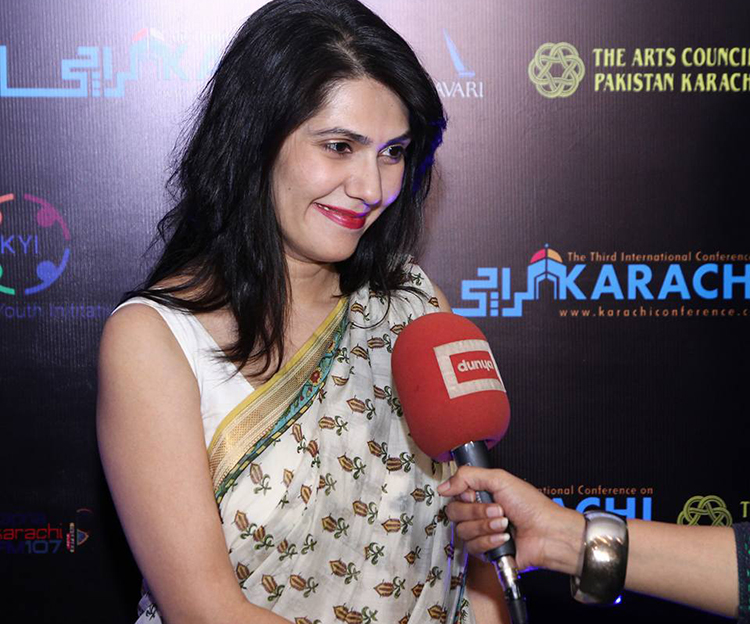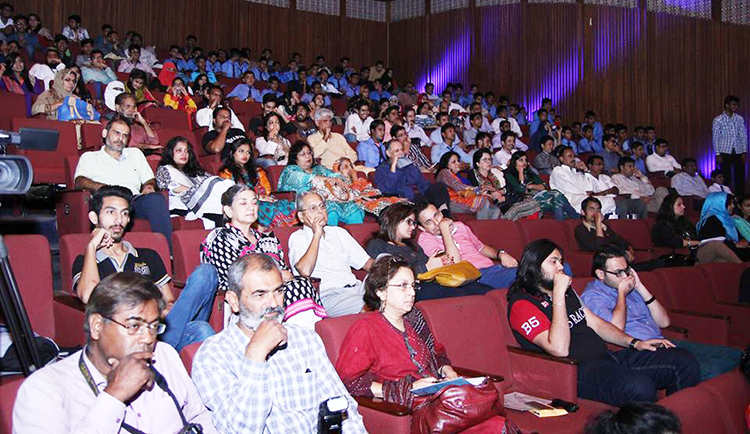Written by: Farheen Abdullah
Posted on: November 11, 2015 | 
As attendees rushed into the auditorium, Dr. Aliya Naqvi, one of the leading organizers of the conference, welcomed them to the first session of the day, titled ‘Reminiscence: The Cosmopolis’. She then handed over the stage to the Chair, Meher Noshirwani, a sociologist who is currently working on a project called ‘Matan’, which creates environmentally friendly handcrafted cane products by using local resources. Three distinguished speakers were each given 15 minutes to make the audience aware of their contributions and describe their respective projects, followed by an interactive discussion.

Mr. Riaz Ahmed Shaikh, Head of the Department of Social Sciences at SZABIST, Karachi, began a series of presentations, whose central focus was the Theosophical Society (TOS). Deriving from the word ‘theosophy’ which literally means ‘God’s wisdom’, TOS was founded in 1875 in New York with three main objectives: universal brotherhood of humanity, study of comparative religion, philosophy and science, and explanation of the laws of nature. Established in 1896, the Karachi Theosophical Society, too, serves as a platform for likeminded individuals of various ethnic and religious groups to come together and reflect upon the matters that concern the bond that the universe, humanity and the divine share. When H. M. Naqvi, the panelist, questioned the current and future goals of the Karachi TOS, Mr. Riaz stated that the organization had no political interests, and it simply aspired to achieve a more tolerant and unified world. Youngsters, especially, were encouraged by the speaker to become active in society and act as the bridge between current and future generations.
The next speaker, Mr. Raza Naeem, had come all the way from Lahore to talk about his extensive research on Sibt-e-Hasan, an eminent scholar, journalist and activist of Pakistan, also often regarded as the pioneer of Marxist thought in Pakistan. Some of the latter’s influential works include Naveed-e-Fikr, Musa say Marx tak, and Maazi kay Mazar, which Mr. Raza highlighted in his presentation. In response to questions regarding Sibt-e-Hasan’s marginalization, Mr. Raza stated that the scholar was and will always remain a unifying figure for the people of Pakistan, and that even though post-modernists marginalized “the left” in present academic studies, his contributions cannot be neglected or diminished.

Finally, Mr. Akhtar Hussain Balouch spoke on the Parsi community of Karachi and all that the city owed to their ancestors. Breaking the stereotypical image that most people seem to have of Parsis (courtesy of the Indian film industry, which shows them as individuals dressed in frocks and hats), the speaker discussed the negligence that exists when it comes to contributions of people like Edulji Dinshaw. Apart from institutions like The Mama Parsi Girls’ Secondary High School and the B.V.S. Parsi High School, the Parsi community has made substantial investments in hospitals and dispensaries of the city for more than a century. However, the city has failed to return the favor, other than by naming a few roads after the benefactors. Unfortunately, most students of NED University, too, are unaware of the fact that their institution is named after Nadirjee Edulji Dinshaw. Parsi ideologies have been preserved in the institutions and hospitals that they built for the city, but so far they haven’t received the recognition that they deserve.
The session was concluded after a brief but constructive set of questions and comments, which focused on the neglected facets of the metropolis. At the end of the discussion, Mr. Naqvi left the audience pondering over why Karachi seemed to have given birth to more intellectuals than other cities of the country, including Islamabad, the capital. Was it because of the demographics? Or the fact that particular areas of the city had a literacy rate of 98%? These and other perplexing questions pave the way for further debate, and maybe even another conference.
You may also like: